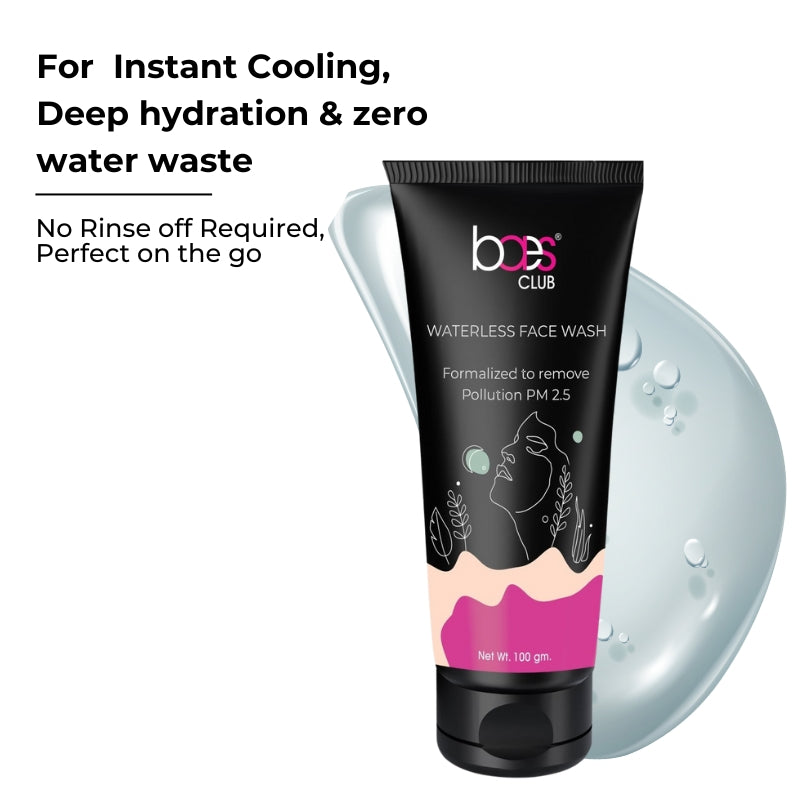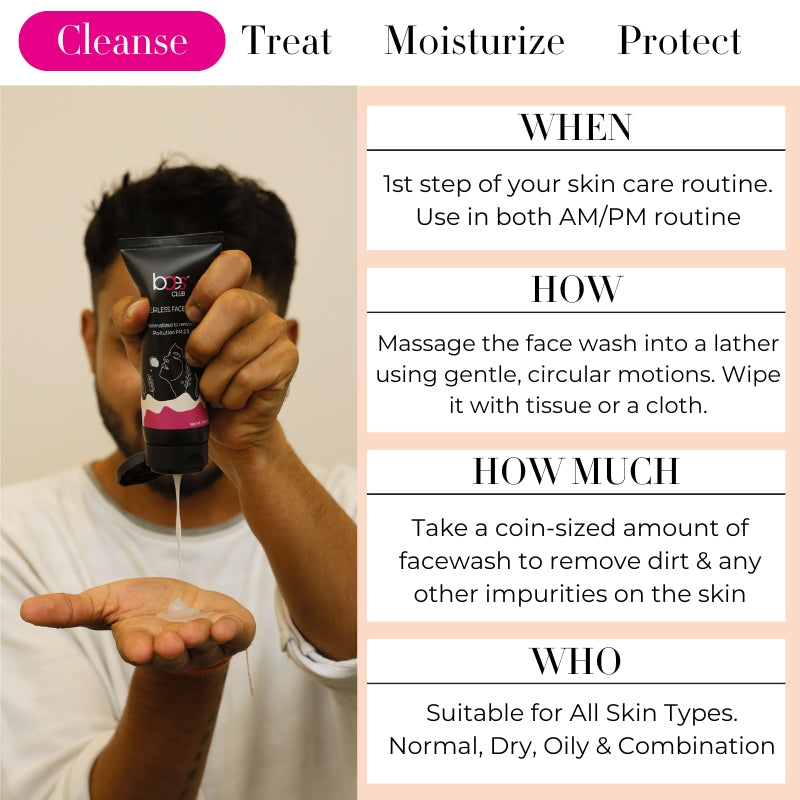When it comes to skincare, cleansing is the essential first step. A good face wash or cleanser can set the foundation for healthy, glowing skin. However, with a multitude of products available, it can be overwhelming to understand the differences, benefits, and how to choose the right one for your skin type. In this comprehensive guide, we’ll explore everything you need to know about face washes and cleansers, including what they are, why they are important, when to use them, and who should be using them.
What Are Face Washes and Cleansers?
Face washes and cleansers are skincare products designed to remove dirt, oil, makeup, and impurities from the skin. They come in various forms, including gels, foams, creams, oils, and wipes, each formulated to cater to different skin types and concerns.
- Face Wash: Typically a liquid product that foams up when applied to wet skin. Face washes are often designed to deeply cleanse the skin and remove excess oil and makeup. They are best suited for those with oily or combination skin types.
- Cleansers: This term encompasses a broader range of products, including cream-based or oil-based formulations that may not foam. Cleansers are often more hydrating and gentle, making them suitable for dry or sensitive skin types.
Why Is Cleansing Important?
Cleansing is crucial for maintaining healthy skin for several reasons:
- Removes Impurities: Throughout the day, your skin accumulates dirt, sweat, oil, and pollutants. Cleansing helps to remove these impurities, preventing clogged pores and breakouts.
- Prepares the Skin for Other Products: Clean skin allows serums, moisturizers, and treatments to penetrate more effectively, enhancing their benefits.
- Balances Oil Production: Regular cleansing helps regulate oil production, which can prevent excess shine in oily skin and reduce dryness in drier skin types.
- Promotes Skin Health: Proper cleansing can prevent skin issues such as acne, dullness, and uneven texture, leading to a healthier, more radiant complexion.
- Supports Skin Barrier Function: A gentle cleanser helps maintain the skin's natural barrier, preventing moisture loss and protecting against environmental aggressors.
When Should You Use a Face Wash or Cleanser?
Establishing a cleansing routine is essential for achieving healthy skin. Here’s a guideline for when to use face washes or cleansers:
- Morning: Start your day with a gentle cleanser to remove any sweat, oil, or product buildup from overnight. This prepares your skin for the application of skincare products and makeup.
- Evening: Cleanse your skin thoroughly at the end of the day to remove makeup, dirt, and pollutants accumulated throughout the day. A double cleanse is often recommended for those who wear makeup or sunscreen: first with an oil-based cleanser to dissolve makeup and then with a water-based cleanser to remove impurities.
- After Exercise: If you’ve been sweating or exercising, it’s important to cleanse your face afterward to remove sweat and bacteria that can lead to breakouts.
- As Needed: If your skin feels particularly oily or dirty, feel free to cleanse as needed. However, avoid over-cleansing, which can strip the skin of its natural oils and cause irritation.
Who Should Use a Face Wash or Cleanser?
Everyone can benefit from using a face wash or cleanser, regardless of age or skin type. However, the specific product and formula you choose should align with your skin type and concerns:
- Oily Skin: Those with oily skin can benefit from gel or foam cleansers that contain salicylic acid or tea tree oil to help control excess oil and prevent breakouts.
- Dry Skin: Creamy or hydrating cleansers with ingredients like glycerin or hyaluronic acid can help cleanse without stripping the skin of moisture.
- Sensitive Skin: Gentle, fragrance-free cleansers are ideal for sensitive skin to avoid irritation. Look for products with soothing ingredients like aloe vera or chamomile.
- Combination Skin: A balanced cleanser that addresses both oily and dry areas is recommended. A gel-cream hybrid may be suitable for this skin type.
- Acne-Prone Skin: Individuals with acne-prone skin should opt for non-comedogenic cleansers that contain active ingredients like benzoyl peroxide or salicylic acid to help clear breakouts.
- Mature Skin: Creamy or oil-based cleansers can help hydrate mature skin while removing impurities without causing dryness.
How to Choose the Right Face Wash or Cleanser
Choosing the right face wash or cleanser can make a significant difference in your skincare routine. Here are some tips to help you select the best product for your skin:
- Identify Your Skin Type: Knowing whether your skin is oily, dry, sensitive, or combination will help you choose a product that caters to your specific needs.
- Look for Key Ingredients:
- Hydrating Ingredients: Glycerin, hyaluronic acid, aloe vera, and ceramides are excellent for dry skin.
- Exfoliating Ingredients: Salicylic acid or glycolic acid can help with oil control and acne.
- Soothing Ingredients: Chamomile, calendula, and green tea can help calm sensitive skin.
- Read Labels: Avoid products with harsh ingredients, such as sulfates, parabens, or artificial fragrances, especially if you have sensitive skin. Instead, look for gentle, non-irritating formulations.
- Consider Your Lifestyle: If you wear heavy makeup or sunscreen regularly, you may want to opt for an oil-based cleanser or micellar water to ensure a thorough cleanse.
- Patch Test New Products: If you’re trying a new product, perform a patch test on a small area of your skin to ensure you don’t have an adverse reaction before applying it to your face.
How to Properly Use a Face Wash or Cleanser
Using your cleanser effectively can maximize its benefits. Here’s how to properly cleanse your face:
- Start with Clean Hands: Always wash your hands before touching your face to prevent transferring dirt and bacteria.
- Wet Your Face: Use lukewarm water to dampen your face. Hot water can strip the skin of moisture, while cold water may not effectively remove dirt and oil.
- Apply the Cleanser: Dispense a small amount of cleanser into your hands, and gently massage it onto your skin using circular motions. Focus on areas that tend to be oilier or have makeup buildup.
- Rinse Thoroughly: Rinse your face thoroughly with lukewarm water to ensure all product and impurities are removed. Make sure no cleanser residue remains, as this can lead to irritation.
- Pat Dry: Use a clean towel to gently pat your face dry. Avoid rubbing your skin, as this can cause irritation.
- Follow Up with Skincare: After cleansing, follow with toner, serum, and moisturizer to lock in hydration and protect your skin.
Common Mistakes to Avoid When Cleansing
To ensure you’re getting the most out of your cleansing routine, avoid these common mistakes:
- Over-Cleansing: Washing your face too frequently or using harsh cleansers can lead to dryness, irritation, and compromised skin barrier function. Stick to cleansing twice a day.
- Ignoring the Neck and Décolleté: Remember to cleanse your neck and décolleté, as these areas also accumulate dirt and oil.
- Using Hot Water: Hot water can strip your skin of natural oils. Always opt for lukewarm water when cleansing.
- Not Removing Makeup First: If you wear makeup, it’s important to remove it first with a makeup remover or cleansing oil before using your regular face wash.
- Skipping Moisturizer After Cleansing: Always follow up with a moisturizer after cleansing to hydrate and protect your skin.
Conclusion
Cleansing is a vital step in any skincare routine, laying the foundation for healthy, glowing skin. By understanding the differences between face washes and cleansers, identifying your skin type, and choosing the right products, you can effectively remove impurities and prepare your skin for the next steps in your regimen. With the right knowledge and practices, you’ll be well on your way to achieving a radiant complexion. Remember, consistency is key, and with time, your skin will thank you for it!

 Papaya, Saffron & Turmeric Face WashPapaya, Saffron & Turmeric Face Wash
Papaya, Saffron & Turmeric Face WashPapaya, Saffron & Turmeric Face Wash
 Tea Tree, Neem & Aloe Vera Face WashTea Tree, Neem & Aloe Vera Face Wash
Tea Tree, Neem & Aloe Vera Face WashTea Tree, Neem & Aloe Vera Face Wash
 Waterless Face WashWaterless Face Wash
Waterless Face WashWaterless Face Wash







